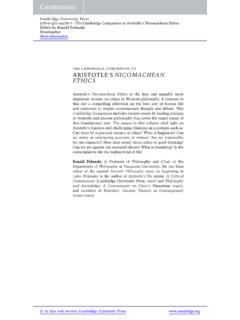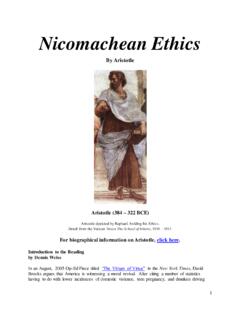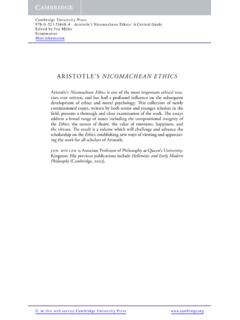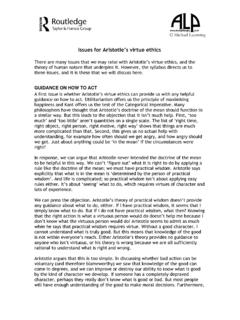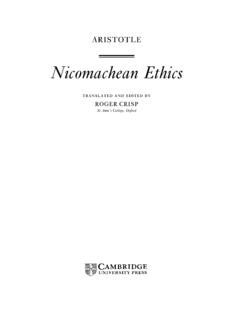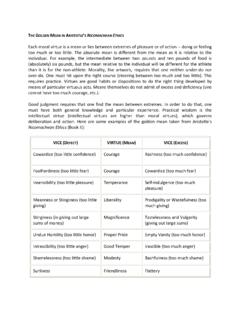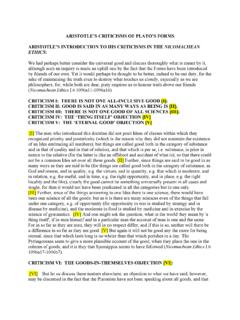Transcription of Aristotle's Account of Friendship in the 'Nicomachean Ethics'
1 Aristotle's Account of Friendship in the " nicomachean ethics "Author(s): A. D. M. WalkerSource: Phronesis, Vol. 24, No. 2 (1979), pp. 180-196 Published by: BRILLS table URL: .Accessed: 18/10/2013 03:25 Your use of the JSTOR archive indicates your acceptance of the Terms & Conditions of Use, available at ..JSTOR is a not-for-profit service that helps scholars, researchers, and students discover, use, and build upon a wide range ofcontent in a trusted digital archive. We use information technology and tools to increase productivity and facilitate new formsof scholarship. For more information about JSTOR, please contact .BRILL is collaborating with JSTOR to digitize, preserve and extend access to This content downloaded from on Fri, 18 Oct 2013 03:25:21 AMAll use subject to JSTOR Terms and ConditionsAristotle's Account of Friendship in the nicomachean ethics A. D. M. WALKER The nicomachean ethics , as is well known, distinguishes three types of Friendship - the Friendship of goodness, the Friendship of pleasure, and the Friendship of utility.
2 How are these three types of Friendship supposed to be related to one another? It has often been said that aristotle regards them as focally related1, but W. W. Fortenbaugh has recently argued against this and suggested that the essential connection is provided by the notion of analogy2. It seems to me, however, that neither Fortenbaugh nor his opponents are correct. It will be the central claim of this paper that aristotle relates the three types of Friendship not by appeal either to the notion of analogical or to that of focal homonymy, but in terms of a third and little noticed form of homonymy: his view, very roughly expressed, is that all three forms of Friendship do in a sense meet the definitional requirements for Friendship but that whereas the Friendship of goodness does so straightforwardly, the friendships of pleasure and of utility do so only in a way or only with certain qualifications.
3 My programme is rather complex. Fortenbaugh's claim, that the three types of Friendship are analogically related, is part of a wider interpretation of NE VIII and IX and cannot be considered in isolation from this. I shall therefore begin in Part I by examining Fortenbaugh's case for his inter- pretation. In Part II I shall sketch out an alternative interpretation, which, I believe, more accurately reflects Aristotle's view of the relationship bet- ween the various forms of Friendship . And finally in Part III I shall try to clarify the view I have attributed to aristotle by defending it against the charge that it does after all reintroduce focal homonymy into his Account . I I begin therefore with fortenbaugh's overall interpretation of NE VIII and IX. For my purposes the essence of his approach is captured in the following four propositions to which he declares his adherence: (i) that friendships are defined by aristotle in terms of their function (op.)
4 Cit. pp. 52-53); (ii) that since the three types of Friendship have different functions they 180 This content downloaded from on Fri, 18 Oct 2013 03:25:21 AMAll use subject to JSTOR Terms and Conditionscannot be given a single definition but are to be regarded as ana- logically related (pp. 53-54); (iii) that this relation of analogical homonymy is referred to in NE 157 a 31-33 (where many commentators have supposed a reference to focal homonymy) (p. 54); and (iv) that the three features enumerated in VIII 2 (1155 b 27-1156 a 5) - reciprocal affection, goodwill, and an awareness of such affection and goodwill - constitute necessary but not sufficient conditions of Friendship (p. 55). Of course, these four claims do not exhaust Fortenbaugh's interpretation. He allows, for example, that the three kinds of Friendship are linked by aristotle not only in terms of analogy but also by a web of more obvious points of resemblance (such as, for example, the pleasantness which cha- racterises both the Friendship of goodness and that of pleasure) (pp.
5 54-57). My present concern, however, is not to oppose this 'secondary' strand in Fortenbaugh's interpretation - it will receive some indirect comment in Part II - but to examine his case in support of claims (i)-(iv). We do well to appreciate at the outset the connections between these claims and, in particular, that the truth of claim (i) is crucial to Forten- baugh's approach. This is not simply a matter of claim (i)'s being pre- supposed by claims (ii) and (iii), so that the falseness of the former carries with it the falseness of these latter. More significantly, (i) plays a vital, if inexplicit, role in Fortenbaugh's argument for his interpretation. For if we grant claim (i), that friendships are to be defined in terms of function, it seems plausible that the different types of Friendship must have different functions; and once the inevitable question 'Why, then, should these dif- ferent associations all count as friendships?
6 ' gets asked against such a background, an appeal to the notion of analogy does have a certain attractiveness. Thus claim (ii), while not logically implied by (i), is what we might call a natural consequence of it. Besides this, (i) obviously constitutes a conclusive ground for (iv): clearly, if friendships are to be defined in terms of function, the features listed in VIII 2, which include no reference to function, cannot be sufficient, but must be at best necessary, conditions of Friendship . The crucial part which claim (i) plays in Fortenbaugh's case becomes even clearer when we notice that Fortenbaugh adduces almost no evidence specifically in support of claims (ii)-(iv). Thus, he finds only one reference in the text of NE VIII-IX to the supposed analogical relation between the three types of Friendship (the existence of which is asserted in claim (ii)), 181 This content downloaded from on Fri, 18 Oct 2013 03:25:21 AMAll use subject to JSTOR Terms and Conditionsand that is the passage at 1157 a 30-33 whose interpretation is the subject of claim (iii).
7 Moreover, he offers only the weakest of reasons for supposing that these lines do contain such a reference: his argument is in effect that the passage should be interpreted as containing a referencc to analogy because it can be so interpreted3. Finally, claim (iv) is simply stated in passing (p. 55) as though it were an obvious truth not needing further argument - a reasonable procedure if (i) is already accepted but not otherwise. Claim (i), then, that friendships are defined by aristotle in terms of their function, obviously lies at the heart of Fortenbaugh's interpretation, and that being so, we must look closely at the grounds on which he urges its acceptance. Fortenbaugh opens his case for claim (i) as follows: 'It is an Aristotelian principle that the being of any functional thing consists in its capacity to perform its function (Meteor. 390 a 10-13). For any purposeful thing, whether a natural object or an organism, whether a man-devised tool or activity or association, its essential nature is determined by its function and is expressed by the logos which states its purpose.
8 This is well-known in the case of a non-natural object like the saw .. Friendships .. are like saws in being purposeful.' It is difficult to be certain exactly how Fortenbaugh wishes to argue here. Part of the trouble stems from his using 'functional' and 'purposeful' as equivalent (a tendency exacerbated in the rest of the paragraph when he rings the changes on a whole galaxy of expressions ('having a use', 'having a purpose', 'goal directed', 'goal oriented', 'having a goal') as though each was straightforwardly interchangeable with 'functional'). On the face of it, his argument seems reducible to the syllogism: whatever has a function is, according to aristotle , to be defined in terms of that function; friendships have a function, and hence, according to aristotle , are to be defined in terms of that function. As it stands, though, this argument merely assumes the truth of the minor premiss, that friendships are, either in fact or in Aristotle's eyes, functional.
9 If Fortenbaugh considered it obvious, that would seem to be the result of his treating 'function' and 'purpose' as interchangeable. It may perhaps be true that friendships have a purpose, at least in the sense that friends generally have certain purposes within the relationship: but nothing follows from this about the functional nature of the relationship. The function of an activity or association cannot be equated with the purposes of the participants: when aristotle functionally defines the polis as existing to promote the good life (Pol. 1280 b 31-1281 a 4), this function cannot be straightforwardly read off from the purposes of the politai. Of course, the troublesome premiss that friendships are func- 182 This content downloaded from on Fri, 18 Oct 2013 03:25:21 AMAll use subject to JSTOR Terms and Conditionstional could be omitted, and so not require justification, if Fortenbaugh supposed aristotle to hold the stronger thesis that everything is to be functionally defined - a view which Meteor.
10 390 a 10-13, as well as Pol. 1253 a 23, might tempt us to regard as Aristotelian. Clearly, this more powerful premiss would immediately yield the conclusion that, according to aristotle , Friendship should be functionally defined. But the snag in this new version of the argument, embodying its yet stronger 'commitment to function' on Aristotle's part, is that from time to time aristotle explicitly, and very sensibly, denies the principle that literally everything is to be given a functional definition (De Gen. Anim. 722 b 30, 778 a 16-b 1 1; PoL 1267 b 7; and see the note on Pol. 1253 a 23 in W. L. Newman, The Politics of aristotle (Oxford, 1887) II pp. 127-8). In any case, even if Fortenbaugh's argument did establish that aristotle should, on his official principles, so to speak, have given Friendship a functional definition, we should not be justified in assuming automatically that the NE discussion would actually proceed in accordance with these principles.
